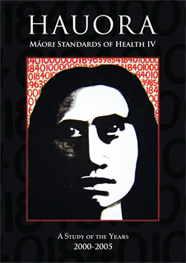

Find reliable, introductory information on the Treaty of Waitangi:
For more information on the Treaty of Waitangi see our Māori subject guide
 Hauora : Maori standards of health IV : a study of the years 2000-2005
by
B. Robson & R. Harris
Hauora : Maori standards of health IV : a study of the years 2000-2005
by
B. Robson & R. Harris
 Nōku te ao : sovereignty of the Māori mind
by
Erena Wikaire, Kayla Wikaire-Mackey, Shaquille Graham, Michael Naera, Emeritus Professor Sir Mason Durie.
The purpose of this report is to present a Māori world view of factors that contribute to discrimination of people who have experienced — or continue to experience — mental distress.
The focus in this research is on Māori and recognises that discrimination associated with mental distress has many causative factors including colonisation, racism, socioeconomic deprivation, different perspectives on ‘mental distress’, historic separation of mental health from other health problems, and the longstanding societal disregard for people who experience mental distress.
Nōku te ao : sovereignty of the Māori mind
by
Erena Wikaire, Kayla Wikaire-Mackey, Shaquille Graham, Michael Naera, Emeritus Professor Sir Mason Durie.
The purpose of this report is to present a Māori world view of factors that contribute to discrimination of people who have experienced — or continue to experience — mental distress.
The focus in this research is on Māori and recognises that discrimination associated with mental distress has many causative factors including colonisation, racism, socioeconomic deprivation, different perspectives on ‘mental distress’, historic separation of mental health from other health problems, and the longstanding societal disregard for people who experience mental distress.